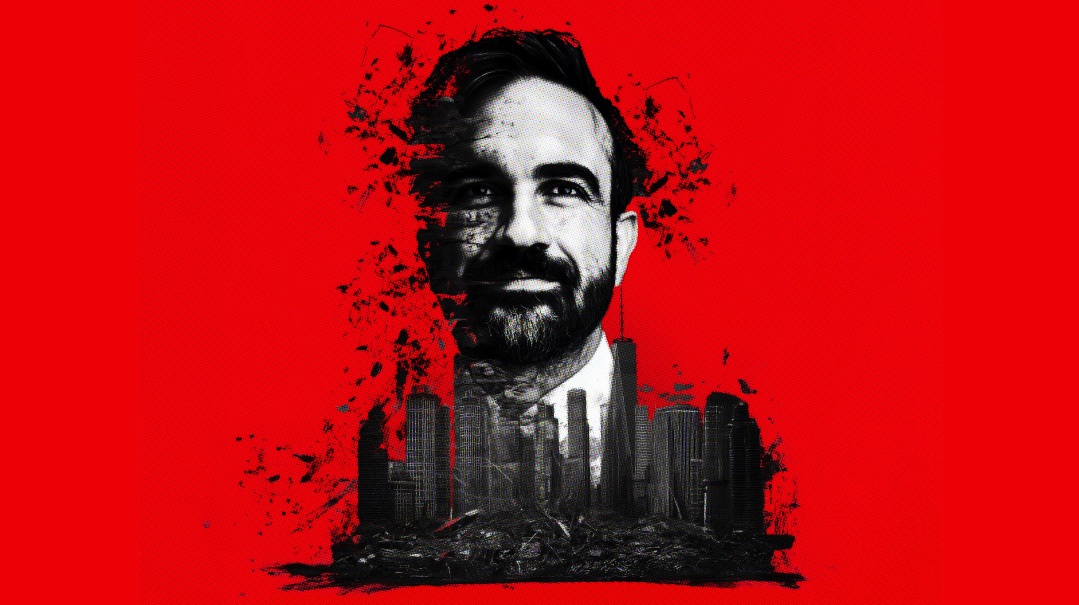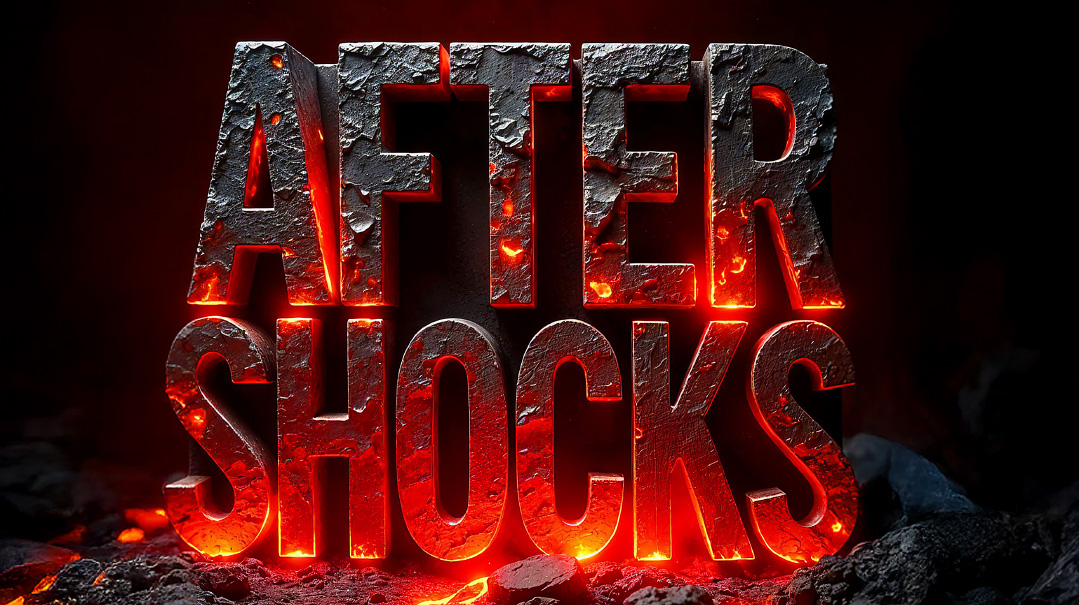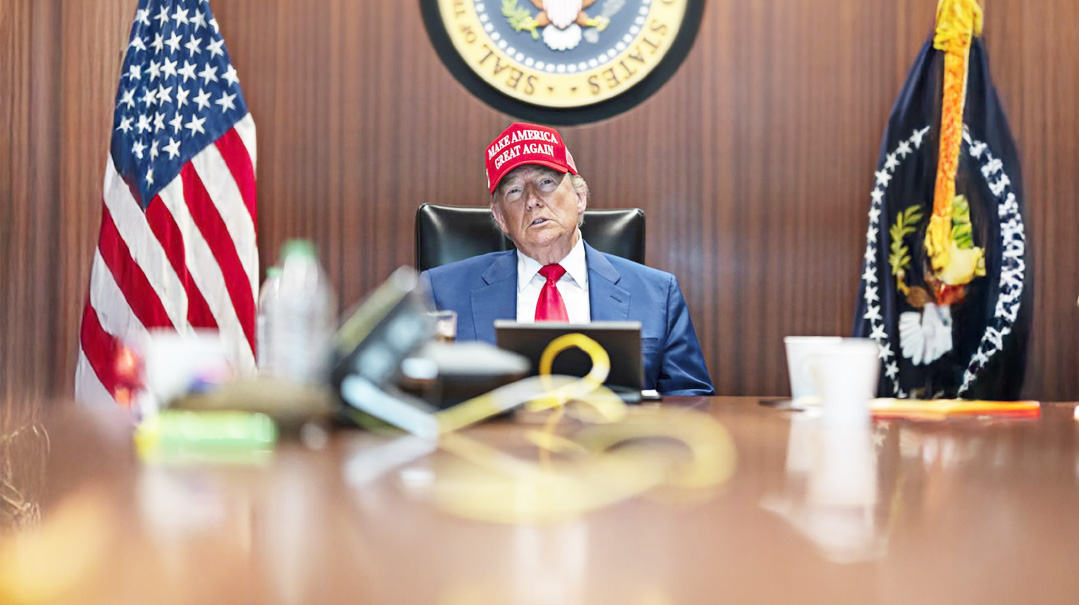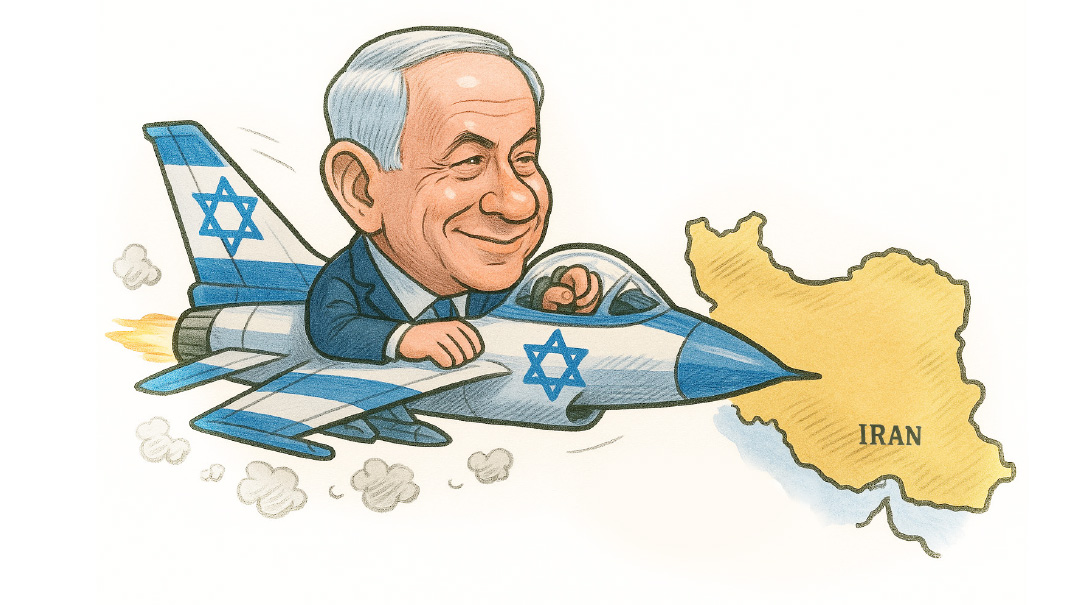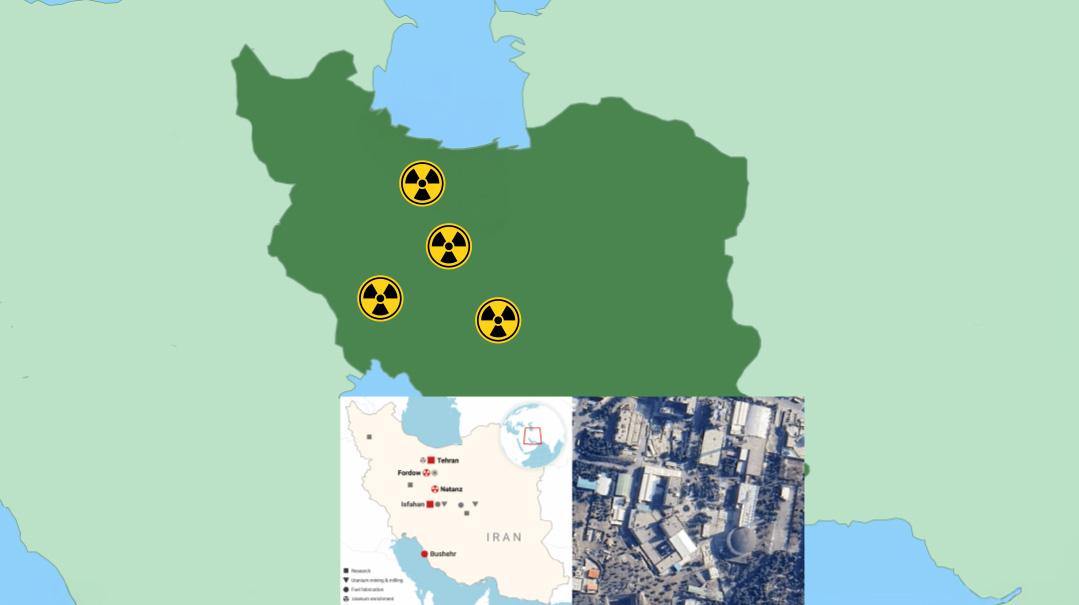Will To Win

With the Netanyahu government under enormous American pressure to hold off from capturing Rafah, a coalition of bereaved parents aims to stiffen Bibi’s resolve in finishing off Hamas
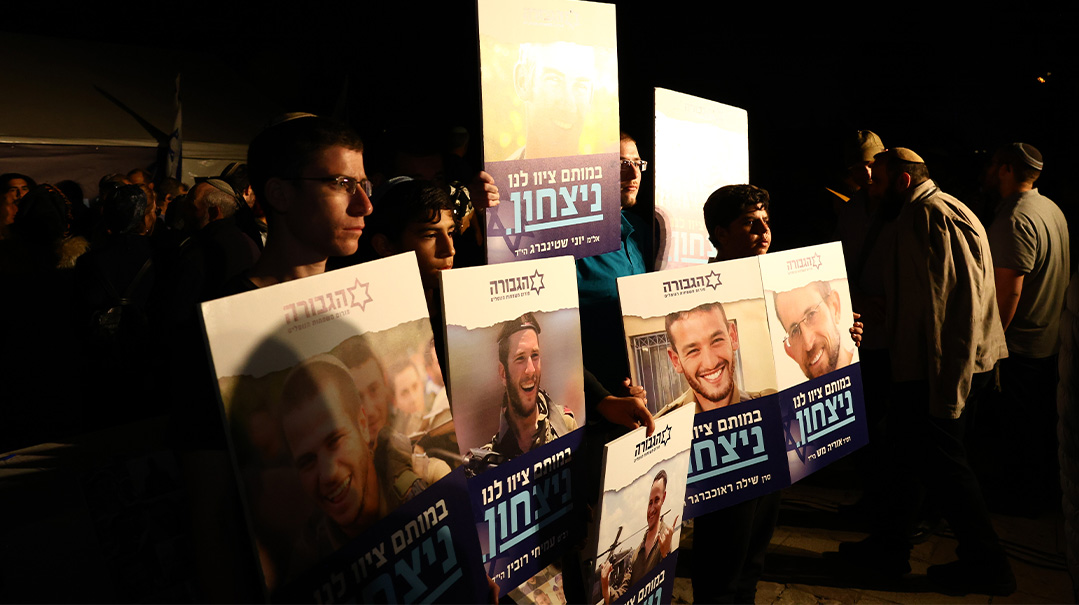
Photos: Elchanan Kotler
For weeks, the IDF has been largely static in Gaza, its long-heralded operation to clear Rafah — Hamas’s final stronghold in the southern Gaza Strip — facing enormous opposition from both the White House and the anti-government protest movement, who want to see a hostage deal done first.
But as seen in a demonstration outside the Knesset last week as the IDF prepared once again to go on the offensive, Israeli passivity has triggered a counter-movement from Bibi’s right flank, which aims to stiffen Netanyahu’s resolve to finish Hamas.
The so-called “Forum HaGvurah” — a group of about 150 families of fallen soldiers — is modest compared to the thousands who turn out weekly for marches demanding Netanyahu’s resignation and a hostage deal at any cost. But its significance goes beyond raw numbers; it represents a groundswell of public opinion that thinks that bowing to the Biden administration demands to halt the war endangers the country, and that the best way to release hostages is by massive military pressure on Hamas.
Yoshua Shani, a former senior IDF officer and father of Ori Mordechai, a soldier who was killed on October 7, is one of the Forum’s leaders.
“We came here to be the moral force of the people and tell the leaders that you work for us, not for Blinken or Biden, and you have to enter Rafah because that’s what the people expect,” Shani told Mishpacha. A day before the demonstration, Shani says, he had a face-to-face meeting with the prime minister. “Netanyahu reiterated his commitment to enter Rafah, and he himself told us that without entering Rafah, it’s not possible to defeat Hamas, but that he’s under pressure from the Americans.”
While proponents of an immediate hostage deal accuse the government of endangering the hostages further by refusing to negotiate properly, Shani strongly rejects the claim: “There’s no greater lie than to say that we are against the families of the kidnapped, because acting in Rafah is the only way to secure their return. When did Hamas release new videos of the kidnapped? When they saw that we are about to enter Rafah. If there is no military pressure on Hamas, we will not see the hostages again.”
Most of the attendees of the Forum HaGvurah rally carry large signs with the image of their fallen relatives, soldiers who either went to defend the Gaza-area kibbutzim on October 7 or who fell in combat since. One of them is Gil Yogev, father of Boaz, who spoke for many in opposing the mass release of security prisoners in exchange for the kidnapped.
“As part of the Shalit deal, more than 1,000 terrorists, including Hamas leader Yahya Sinwar himself, were released. We cannot continue to release murderers. We must do everything to annihilate Hamas,” he asserted. For that to happen, he explained, the government needs to feel that average Israelis demand that it ignores the pressure from foreign leaders to compromise. “We understand that Netanyahu is under crazy pressure from the Europeans, the Americans, and the opposition. We can’t allow Bibi to feel pressure only from one side. We have to exert pressure from the other side. That’s where we come in.”
Highlighting the growing gulf between left and right on the best way to prosecute the war, Yogev added, “We wholeheartedly want all the kidnapped to return alive. But even if, God forbid, one of the kidnapped dies along the way, we need to do it so that there are no more kidnappings. Otherwise, it will happen again, and there will be more kidnappings, and another massacre.”
Daniel Steinberg, whose son Colonel Yonatan Steinberg was commander of the Nahal Brigade and fell battling the Hamas onslaught on Simchas Torah, pushed back against the humanitarian narrative that has been at the heart of the Biden administration’s harsh criticisms over the last few months.
“The whole issue is based on supposed ‘humanitarian’ issues, but only for their side, not for our side, not for the side of the kidnapped, whom no one knows about,” he says. “I don’t just mean the Red Cross, but neither the British, nor the Americans, nor even the supposed Arab allies can tell us if they’ve seen them. We sent medicines, and it’s been proven that they never reached them.”
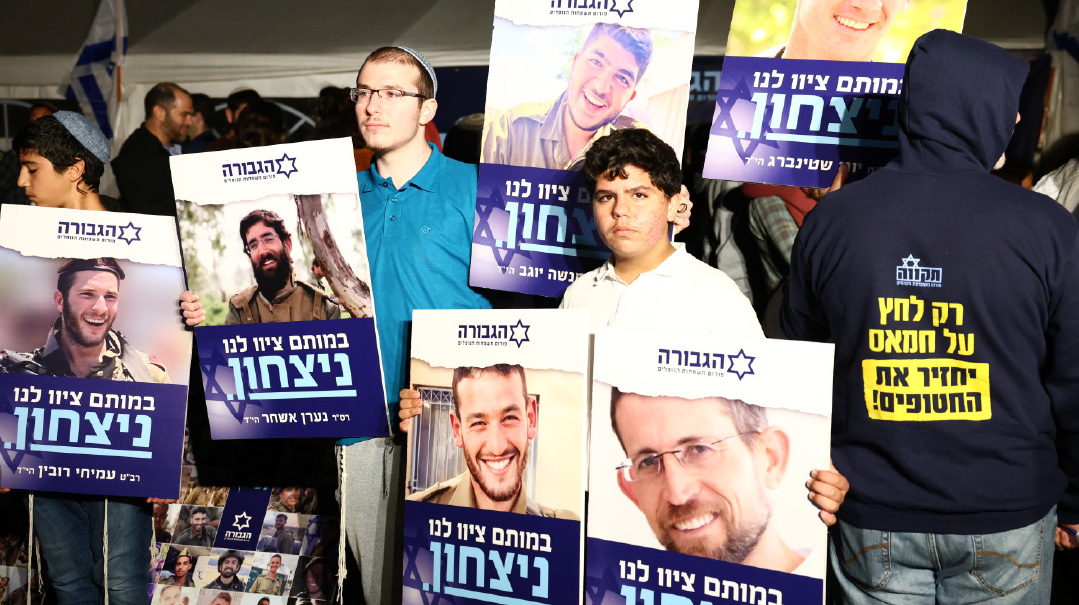
Counterbalance
Rallying outside the Knesset, which is one of the sites frequented by anti-government protesters, highlighted the fact that the debate over the best way to fight the war has itself fallen hostage to the splits in Israeli society that rent the country last year.
The Forum HaGvurah is explicitly designed to counterbalance the Hostages and Missing Families Forum, which was formed on October 13, less than a week after the Hamas terrorist attack, and which has been accused of being another front for last year’s anti-government protests. While the main body of the group consisted of over 340 families of people who were listed at the beginning of the war as kidnapped or missing, the leadership of the organization is strongly identified with Netanyahu’s political foes. A founder, political strategist Ronen Tzur, was behind the ascent of Blue and White Party leader Benny Gantz as a political force. The group’s spokesman until recently was Chaim Rubinstein, a past spokesperson for the opposition Yesh Atid party.
“There is no doubt that Netanyahu is preventing a deal,” claimed Rubinstein. “Netanyahu knows that if he goes to elections now that he won’t be able to form a new government, and he is motivated by cold political considerations.”
That allegation has found expression in a new slogan at the protest marches. “Replace Him, Save Them” references the idea that Netanyahu is the one preventing the return of the kidnapped. That spirit accompanies the massive marches on Tel Aviv’s Kaplan Street.
So while the hostages’ fate is a non-partisan issue, the body most identified with that cause has been tainted with suspicions of political motivations.
Motty Yogev, a former Knesset member for the Bayit Yehudi party between 2013 and 2020, distinguishes between the families and leadership of the hostage-return movement.
“The pressure against Israeli action starts at home, and it’s not always based on pure motivations,” say Yogev. “I believe that the families of the kidnapped have good intentions and are suffering tremendously, but I see that there are people influencing them whose only intention is to bring down Netanyahu and his government.”
As in IDF service itself, where the national-religious sector has sacrificed disproportionately over the course of the war, the attempt to exert pressure on the government from the right flank is notably a dati-leumi effort, as is clear from the makeup of the demonstrators at the rally. One attendee, who stood out for being practically the only member of the group not belonging to the Religious-Zionist movement, was Frida Marziano, whose son Itai died in combat.
“My son went out to defend the people of Israel but couldn’t finish the task,” she says. “I come here to demand that the task our children started be completed.”
Asked whether the media’s characterization of the societal divisions over entering Rafah were correct, she says, “It’s no secret that this Forum was established by the national-religious world, but it represents many families who are secular or Druze. They are with us, but not all have the strength to come out and speak.”
With Netanyahu adamant that the IDF would enter Rafah to topple Hamas with or without American support, and amid reports of evacuation orders being issue to Rafah citizens, participants in the Forum HaGvurah rally were confident that the green light would be given for the operation, despite the forces arrayed against the government. And if the political echelon can overcome its fears, says former MK Yogev, the troops are ready to do the rest.
“The soldiers have the motivation to win,” he says. “I served in the army for 30 years, but I never saw such unity and motivation to fight.”
(Originally featured in Mishpacha, Issue 1010)
Oops! We could not locate your form.

